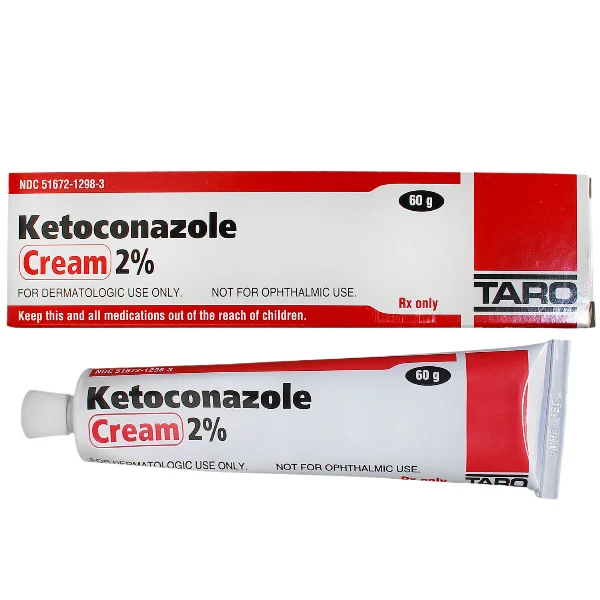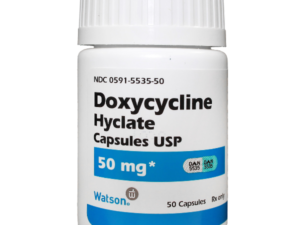Description
Ketoconazole: A Versatile Antifungal Agent with a Complex History
Ketoconazole is a powerful antifungal medication widely used to treat a variety of fungal infections. While effective, its usage has become more nuanced due to potential side effects and the emergence of newer antifungals. This article delves into the mechanisms, uses, potential side effects, and current standing of ketoconazole in the medical field.
How Ketoconazole Works: Inhibiting Fungal Growth
Ketoconazole belongs to a class of antifungal drugs called azoles. Its primary mechanism of action involves inhibiting the synthesis of ergosterol, a crucial component of fungal cell membranes. Ergosterol is essential for the structural integrity and function of the fungal cell. By blocking its production, ketoconazole weakens the fungal cell membrane, ultimately leading to growth inhibition or even cell death.
Specifically, ketoconazole inhibits the fungal enzyme 14-alpha demethylase, also known as lanosterol 14-alpha demethylase. This enzyme is necessary for converting lanosterol into ergosterol. Without ergosterol, the fungal cell membrane becomes porous and leaky, disrupting its normal function.
Uses of Ketoconazole: Treating Diverse Fungal Infections
Ketoconazole is available in various formulations, including oral tablets, topical creams, shampoos, and foams. Its versatility allows it to treat a range of fungal infections, including:
- Skin Infections: Ketoconazole cream and shampoo are commonly used for treating fungal infections of the skin, such as athlete’s foot (tinea pedis), ringworm (tinea corporis), jock itch (tinea cruris), and pityriasis versicolor.
- Scalp Infections: Ketoconazole shampoo is frequently prescribed for seborrheic dermatitis (dandruff) and tinea capitis (scalp ringworm).
- Cushing’s Syndrome: In higher doses, ketoconazole oral tablets can be used to manage Cushing’s syndrome by inhibiting adrenal steroid production. This application is less common now due to the availability of more targeted therapies.
- Systemic Fungal Infections: While less frequently used now due to the availability of more targeted and safer alternatives, oral ketoconazole was previously used to treat certain systemic fungal infections, such as blastomycosis, histoplasmosis, and coccidioidomycosis.
Potential Side Effects and Risks: A Balancing Act
While effective, ketoconazole is associated with a range of potential side effects. These can vary depending on the formulation and dosage:
- Topical Use: Topical formulations like creams and shampoos are generally well-tolerated but can cause skin irritation, itching, redness, or a burning sensation at the application site.
- Oral Use: Oral ketoconazole is associated with more significant side effects, including:
- Liver Toxicity: Liver damage is a serious concern with oral ketoconazole. Regular liver function monitoring is crucial during treatment.
- Hormonal Effects: Ketoconazole can interfere with hormone production, leading to decreased testosterone levels in men, potentially causing gynecomastia (breast enlargement) and reduced libido. In women, it can disrupt menstrual cycles.
- Gastrointestinal Issues: Nausea, vomiting, abdominal pain, and diarrhea are common side effects.
- Drug Interactions: Ketoconazole interacts with many other medications, potentially increasing or decreasing their levels in the blood and affecting their efficacy or toxicity.
The Current Standing of Ketoconazole: A More Cautious Approach
Due to the potential for serious side effects, particularly liver toxicity and hormonal imbalances, the use of oral ketoconazole has become more restricted in many countries. Newer antifungal agents with better safety profiles and narrower spectrums of activity are often preferred for systemic fungal infections.
Topical ketoconazole, however, remains a valuable treatment option for various skin and scalp fungal infections due to its generally good safety profile with minimal systemic absorption.
Important Considerations for Patients:
- Consult a Healthcare Professional: Before using ketoconazole, it is crucial to consult a healthcare professional to determine if it is the right treatment option and to discuss potential risks and benefits.
- Follow Instructions Carefully: Adhere to the prescribed dosage and application instructions.
- Monitor for Side Effects: Be vigilant for any signs of side effects, especially liver problems (jaundice, dark urine, abdominal pain) or hormonal changes.
- Disclose All Medications: Inform your doctor about all medications and supplements you are taking to avoid potential drug interactions.
- Pregnancy and Breastfeeding: Ketoconazole use during pregnancy and breastfeeding should be discussed with a doctor due to potential risks.
Conclusion: A Valuable Tool with Important Caveats
Ketoconazole remains a useful antifungal agent, particularly in topical formulations for treating skin and scalp infections. However, the use of oral ketoconazole requires careful consideration due to the potential for serious side effects. As newer and safer antifungals continue to emerge, the role of ketoconazole is evolving, but its legacy as a valuable antifungal remains. Always consult with a healthcare professional to determine the most appropriate treatment option for your specific condition.















Reviews
There are no reviews yet.